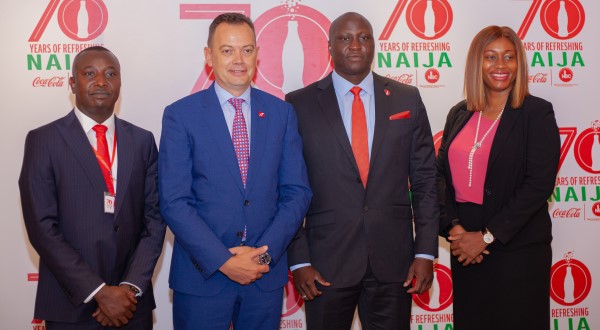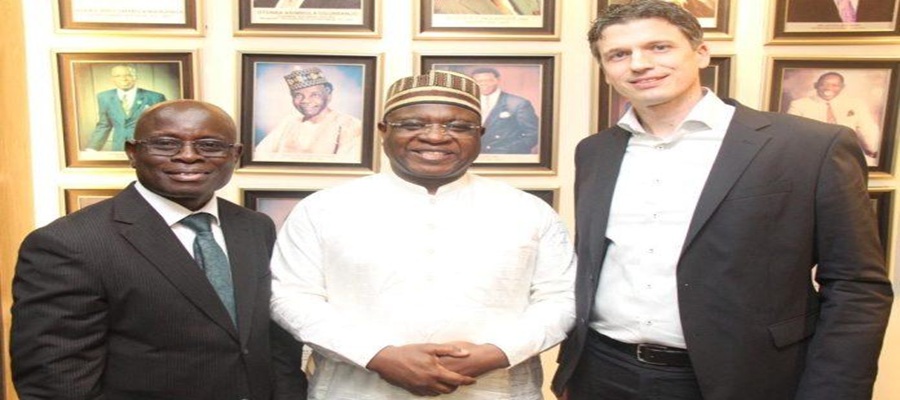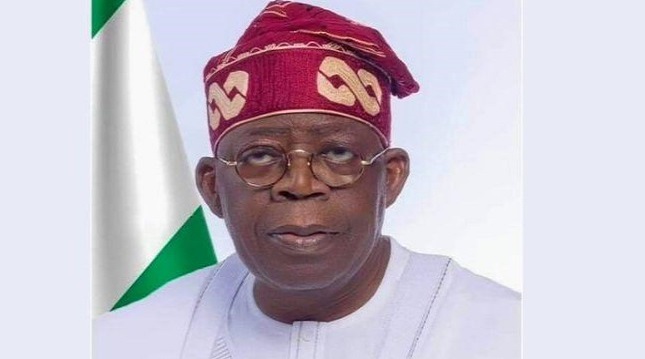News
Coca-Cola Nigeria System to Invest N560b in 5 years, Flags off 70th Anniversary

The Coca-Cola System in Nigeria, comprising Nigerian Bottling Company (NBC) Limited and Coca-Cola Nigeria Ltd, has flagged off activities marking its 70th anniversary celebration in Nigeria, with commitment to invest N560 billion in five years.

This was announced Thursday at a press briefing with key NBC and Coca-Cola Nigeria executives in attendance.
The Coca-Cola System, through the bottling arm NBC, was incorporated in 1951. Today the Coca-Cola system is a leader in the non-alcoholic category with a rich portfolio of brands and array of options across its product offering.
The system has kept growing with its customers with a stated vision to provide a beverage for every occasion around the clock, while positively impacting the nation and economy.
With 8 manufacturing plants, over 7000 dealers, skilled and dedicated employees, and a sophisticated distribution system across Nigeria, there is practically no community in Nigeria where a cold bottle of Coca-Cola is not within the close reach of consumers.
Commenting on the 70th anniversary milestone, Mathieu Seguin, Managing Director of NBC, said, “As we continued to grow, we have been very deliberate about investing heavily to make a positive impact in the lives of people in communities where we work and operate. We believe that our business is only as sustainable as the communities in which we do business, and this is why we have mainstreamed sustainability into every aspect of our business.
“For perspective, in the last 10 years alone, the Coke System has invested more than 9 billion naira in lifting the living standards of communities where we do business in Nigeria, through locally relevant initiatives.
Some of the areas we have had the most impact have been in education and youth development, women empowerment, water, environmental sustainability, sports and the promotion of commerce and entrepreneurship.”
Seguin went on to share some of the impact and notable accomplishments of the Coca-Cola system over the years. In youth development, the System has trained over 30,000 youths on entrepreneurship and employability skills across different cities in Nigeria in the last 5 years.
Under Education, its Tech Relevant Teacher (TRT) project has impacted 24,000 school pupils, with 648 school leaders and teachers trained and several classrooms blocks constructed or renovated in over 30 public schools in the last 5 years, impacted over 30,000 students.
With regards to women development, from 2015 to 2019 alone the Coca-Cola 5by20 program impacted over 470,000 women, with 38,000 women supported to start up their own medium, small or micro businesses as Coca-Cola Distributors or Retailers.
The Lady Mechanic Initiative empowered 100 vulnerable young women with vocational, entrepreneurial and life skills, and equipped them to become certified professional automobile mechanics.
Furthermore, the Safe Birth Initiative, a wellbeing programme to support the efforts of the government towards reducing the alarming numbers of deaths by women and new-born babies from birth-related complication has impacted over 12,000 Mothers and Babies since inception.
Speaking also at the event, Alfred Olajide, Managing Director of Coca-Cola Nigeria remarked that, “Anniversaries are an important part of life. They remind us of important events, both personal and cultural.
“This celebration not only gives us an opportunity to look back at the brand’s storied history in Nigeria but is also an opportunity to highlight our plans for the future. This milestone anniversary is a testament to the possibilities and shared opportunities we have created in this great country.
Beyond an anniversary, this is a story of a company building and establishing long-lasting relationships with diverse groups, individuals, and organisations in a bid to ensure a better-shared future; it is years of system investments that have ensured the oiling of this country’s economic gears; it is years of initiatives that have ensured and fostered community resilience in communities seeking our intervention; it is years of instilling hope, open happiness, positive feelings and the magic of community in audiences.”
The 70th anniversary celebration will run all through the remaining part of 2021 with a line-up of activities designed to celebrate the milestone with the Coca-Cola System’s consumers, customers, employees, partners and the general public for their support towards the growth of the business which include the Anniversary Stakeholder Event, consumer seeding/giveback programmes among others.
“In emphasizing our current Real Magic philosophy, we will be kickstarting The Nigerians of Coca-Cola campaign, which will serve to tell a visual story of a diverse set of people across key regions in the country with different struggles and positive histories with Coca-Cola.
“These are people that have directly benefited from The Coca-Cola System’s sustainability initiatives – from our value system to our key programme areas such as women and youth empowerment, waste, wellbeing, and water stewardship.
“Through this activity, we will also highlight the long-term impact these partnerships and initiatives have had on the communities and individuals.
“To share fun and interesting stories about our beverages, we are also launching the My Coke Moments campaign, to encourage customers and stakeholders across demographics to share nostalgic moments and memories with their online network of friends.
“This further demonstrates Coca-Cola’s cultural relativism in Nigeria and showcases the brand’s longevity and love in the country
“We have also planned Share a Trip with Coke which is an activity that will be spreading Real Magic across four key Nigerian cities.
“Coca-Cola branded buses will be on major routes in Lagos, Kano and Port-Harcourt, and lucky customers that get on the buses will be rewarded with free rides and exclusive brand merchandise.
“To cap off the exciting activities, we will close the celebration with a celebratory dinner in November 2021 to delight our varied stakeholders”.
At the event, the Coca-Cola System presented Socio-Economic Impact Report for 2015-2019 which summarises the impact of the system, the value it has contributed to the Nigerian economy and the investments it is making in communities.
According to Mr. Seguin, “since 2007, we have invested $1.7billiion in the country and we will be investing an additional N560 billion or $1b in our operations in Nigeria.
“In the last five years, the Coca-Cola system has also supported the creation of 58,000 jobs along its value chain”.
In closing, Olajide remarked that, “as we prepare for more decades of excellence and enriching moments, I believe that there are opportunities for us to learn more, listen more, and continue to tailor our beverage solutions, to provide our consumers the brands they love at the different phases of their lives, done sustainably for a better shared future.
We will continue to enable economic empowerment for the people who need it most – downstream and upstream of our supply chain to truly uplift future generations.
Our environmental, social, and governance (ESG) goals are embedded in how we operate as a business – it has been the history and legacy of the business in Nigeria, and our consumers should not expect anything less than the promise of quality, personalization, and the optimism that our beverages inspire.”
Olajide noted that Coca-Cola has always been in the forefront of corporate support for the development of football in Nigeria. Over 10,000 players, from 500 schools and 50 celebrity football coaches have participated in the Copa Coca-Cola programme which has reached the 36 States and the FCT, Abuja since it launched in Nigeria in 2009.
In addition, on January 17, 2018, Coca-Cola Nigeria Limited announced its partnership with Nigeria Football Federation (NFF) as the Official Soft Drink Company and Sponsor of all the Nigeria National Football teams.
The partnership is worth $4 million and will run for five years. Partnerships such as these have brought the FIFA World Cup trophy to Nigeria three times, as part of the FIFA World Cup™ Trophy Tour and have given many consumers the opportunity to travel and watch football tournaments live.
Sustainable manufacturing was also highlighted as an ongoing priority for the System, with a focus on Energy use reduction, Water use reduction, Emissions reduction and World Without Waste through investments made in installations such as Combiner Heat and Power plant, Effluent treatment plants and hybrid solar power installations in its manufacturing plants.
The system also reinforced its global commitment to make all consumer packaging 100% recyclable by 2025 and to enhance the collection of all packaging material by 2030 through its World Without Waste program.
News
NGX Unveils Net-Zero Plan for Greener Capital Market

Nigerian Exchange Limited (NGX) has launched the NGX Net-Zero Programme to guide listed companies toward clear carbon reduction pathways and enhanced climate disclosures aligned with global investor standards.

NGX
The high-level launch engaged chief executives of quoted firms alongside development partners including German Investment Corporation KfW, DEG, and African Foresight Group (AFG), NGX’s implementation partner. Issuers and investors discussed financing decarbonisation, sustainability practices, and attracting climate-aligned capital.
NGX Group Chairman Dr Umaru Kwairanga described the initiative as concrete climate action, commending partners for two years of groundwork. “Today marks leadership and decisive action. Climate change has become a core business imperative, with capital markets mobilising capital and setting standards,” Kwairanga said.
He positioned NGX Net-Zero to support emissions measurement, disclosure, capacity building, and sustainable finance access, urging CEOs to embrace it strategically rather than as compliance. Kwairanga reaffirmed NGX’s goal to make Nigeria’s capital market Africa’s green finance hub.
Group CEO Temi Popoola called climate action a business imperative, noting sustainability-embedded firms attract capital, manage risks, and stay competitive. DEG Management Board Member Monika Beck highlighted partnerships scaling impactful, commercially viable climate solutions.
The event closed with a ceremonial gong marking the programme launch and send-off for outgoing DEG Regional Director Bernd Telemann.
News
Nigeria Off EU High-Risk Money Laundering List in Major Financial Win

Nigerian Financial Intelligence Unit (NFIU) has hailed Nigeria’s removal from the European Union’s list of high-risk third countries for Anti-Money Laundering and Countering the Financing of Terrorism (AML/CFT) as a landmark achievement endorsing the nation’s reform efforts.

Nigerian Financial Intelligence Unit (NFIU)
NFIU CEO Hafsat Abubakar Bakari said the delisting, contained in European Commission Delegated Regulation (EU) C (2025) 8460 adopted December 4, 2025 and effective January 29, 2026, affirms sustained AML/CFT and Counter Proliferation Financing (CPF) reforms.
The move follows Nigeria’s exit from the FATF Jurisdictions under Increased Monitoring after addressing strategic deficiencies, alongside Burkina Faso, Mali, Mozambique, South Africa and Tanzania.
Bakari noted the European Commission recognised Nigeria’s strengthened AML/CFT effectiveness, closed technical gaps, and fulfilled FATF Action Plan commitments leading to grey list removal in June and October 2025.
The delisting eliminates enhanced due diligence requirements for EU financial transactions, easing compliance, boosting cross-border flows, and enhancing Nigeria’s appeal for European trade, investment and partnerships.
The NFIU attributed success to President Bola Ahmed Tinubu’s political will and collaboration among National Assembly, law enforcement, regulators, judiciary, private sector and development partners.
The agency reaffirmed commitment to ongoing FATF, GIABA, EU engagement and domestic framework resilience to maintain international confidence in Nigeria’s financial system.
News
FG Directs Banks, Fintechs to Remit VAT on Service Fees

The Federal Government has directed all banks and fintechs to collect and remit 7.5 per cent value-added tax on certain electronic banking services, effective Monday, January 19, 2026, according to an email notice issued by payment platforms.

The VAT will apply to electronic banking charges, including mobile money transfers, USSD transaction fees, and card issuance fees, according to an email notice on Wednesday shared with customers by Moniepoint.
For example, if a bank charges N100 to make a transfer, the 7.5 per cent VAT will be applied to that service fee, not the money being sent.
“From Monday, January 19, 2026, we are required to collect a 7.5 per cent VAT, to be remitted to the Nigerian Revenue Service (formerly known as the Federal Inland Revenue Service).
“VAT will apply to certain banking services that include electronic banking charges such as mobile banking fees (transfers), USSD transaction fees, and card issuance fees,” the email read.
Other operators are expected to issue similar notices to their customers in the coming days. Services that will remain exempt include interest earned on deposits and savings, meaning customers will not pay tax on the returns from their accounts.
The NRS, formerly known as the Federal Inland Revenue Service, has set the deadline to ensure that all commercial banks, microfinance banks, and electronic money operators comply with the collection and remittance requirement.
Moniepoint stressed that this is not a price increase but a statutory obligation. “Moniepoint is required to collect and remit VAT to the Nigerian Revenue Service,” the company said in a statement.
The move is part of the government’s broader efforts to standardise VAT collection on digital financial services and expand revenue generation amid Nigeria’s growing digital economy. VAT on banking transactions is not entirely new; the NRS is now enforcing uniform collection rules across all platforms, ensuring compliance across the sector.
Customers have been assured that the new tax will be clearly itemised, with the VAT shown separately on transaction statements and reports.
In December, several commercial banks informed customers that the N50 stamp duty would be deducted on electronic transfers of N10,000 and above, following the commencement of provisions of the new Tax Act.
The charge, previously known as the EMTL, has now been formally reclassified as stamp duty and will be applied as a one-off fee on qualifying electronic transfers.

 E-Financial2 days ago
E-Financial2 days agoPaystack Expands Beyond Payments into Banking

 E-Financial2 days ago
E-Financial2 days agoSEC Partners Police in Nationwide Crackdown on Ponzi Schemes, Crypto Frauds

 E-Business2 days ago
E-Business2 days agoNigeria Targeted with 4,622 Cyber-attacks Per Week in December 2025

 General News2 days ago
General News2 days agoEFCC to Use Space Technology to Boost Asset Tracking, Investigations

 E-Financial2 days ago
E-Financial2 days agoFG Halts Tax Guidelines Amid Uncertainty Over Final Laws – Oyedele

 E-Financial2 days ago
E-Financial2 days agoPaystack Buys Microfinance Bank, Enters Nigeria Banking Arena

 News2 days ago
News2 days agoFG Directs Banks, Fintechs to Remit VAT on Service Fees

 General News2 days ago
General News2 days agoHow to Stay Safe Online During Sales Periods



















